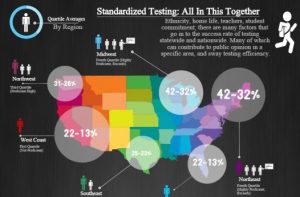While politicians insist that A.C.T. testing should be required, facts disagree
Anxiety builds as students line up to take the A.C.T. at Century College, a test that will likely deceive people.
January 10, 2020
The A.C.T is supposed to be a test that measures a persons capacity as a student by evaluating them in the four subjects of english, math, reading, and science. ACT, inc. is the non-profit organization which created the A.C.T. test. They continue to assert that the assessment measures a student’s academic capabilities and accurately determines if a student will be a good addition to a university. However, despite what educators and law makers insist, the truth is that the A.C.T. inaccurately measures a student’s capabilities and gives upper class students an unfair advantage.
The A.C.T. was first introduced in 1959 by University of Iowa professor Franklin Lindquist as a more effective alternative to the S.A.T., surpassing the S.A.T. by total number of test takers for the first time in 2012.
“I do not think you expect the A.C.T. score that you get, especially haven taken it a couple of times, I feel like there were times where I was like ‘oh, I did much better on this portion than I did before’ and my score would come back lower,” senior Grace McDonough said.
This idea that the A.C.T. is not an accurate indicator of a person’s academic capabilities has been reflected by others as well. Social Studies teacher Matthew Bergquist said he does not like the A.C.T. because it is just a snapshot. It only shows how well a person can take a test on one day.
“I had a student in my graduating class who at high school and she was smart, but she took the test four times, and the score kept increasing until she had a perfect score. What does that tell you? It tells you that she has perseverance, and and grit. She kept with it and kept improving, but it mostly tells you that her parents were willing to flit several hundred dollars to keep trying until she got that perfect score,” Bergquist said.
McDonough also cited a Brookings Institute study she read saying the best predictor of a person’s A.C.T. score is their household income.
As scholar Andre M. Perry of Brookings Institute said, “For what it’s worth, scores from the S.A.T. and A.C.T. tests are good proxies for the amount of wealth students are born into: income tracks with test performance. The more money a student’s parents make, the more likely he or she will have a higher score. It follows, then, that the less money you make, the more likely you’ll be denied a chance at a selective institution.”
The plutocratic nature of standardized tests have plagued them since their inception and it must stop. To deny students from low income families, many of whom may be very gifted, the chance to enter a prestigious university, or any university for that matter, is a true injustice that should not be tolerated.
However, income bias is not the only ailment plaguing the A.C.T., test anxiety has proved a major issue as well.
“For other students, it does not come easy for them. And so it is an extreme point of stress to prepare for it, to understand the testing. Just the testing style, the fact that it is timed, that most times it is offered in a location that is not familiar to them, can be really anxiety producing,” said counselor Becky Hopper, when asked about test anxiety.
This amount of pressure is unfair to students. Truly brilliant students can be completely taken down by anxiety and the fact that the A.C.T. does a lot to increase that anxiety truly does students an injustice.
However, the A.C.T. does have some advantages. As McDonough pointed out, if a person is a strong test taker, taking the A.C.T. provides them with the chance to show that to colleges. Being a strong test taker is a desirable trait for many schools and so using the A.C.T. to show this can actually be beneficial.
In spite of its few advantages, keeping the A.C.T. as a required exam and as one of the biggest influences in college applications would be detrimental: favoring higher income families and putting youth who suffer from anxiety at a disadvantage. The existence of the A.C.T. is not a problem, but the fact that it is required and one of the biggest considerations for universities is unjust in many ways. Students should be represented through their academic achievements and complex analysis of their capabilities as a student which ignores variables such as income.










